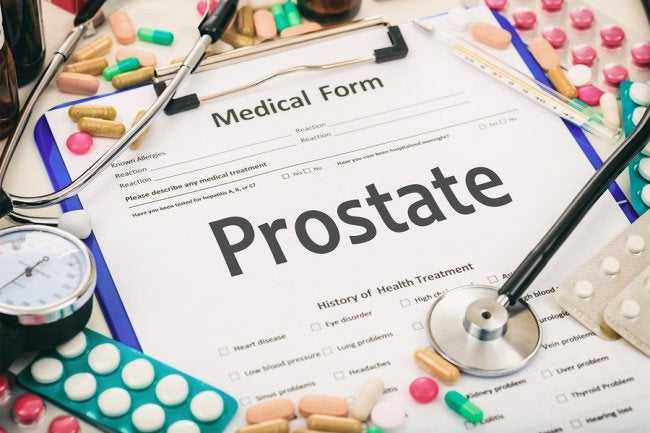-
Get the Answers to Your Questions About Prostatic Intraepithelial Neoplasia

After you undergo a prostate biopsy, the pathologist will study the tissue in a lab, and develop a report of the findings. One of those findings might possibly be prostatic intraepithelial neoplasia (PIN). Your urologist will discuss PIN and any other abnormalities in the pathology report. You should feel free to ask as many questions as you need in order to fully understand your diagnosis and the next steps to take.
Does PIN mean I have prostate cancer?
PIN is not the same thing as cancer. However, it can be a precancerous condition. Ask your urologist whether you have low-grade or high-grade PIN. Low-grade PIN does not appear to increase the risk of prostate cancer. It’s possible that high-grade PIN does raise the risk of cancer . Know that even if you do have high-grade PIN, this doesn’t mean you’ll definitely develop cancer—many men with PIN don’t.
What exactly is PIN?
The broad definition of PIN is simply that some of the cells in the prostate have started to look and function in abnormal ways. These abnormal cells can be found in the lining of the duct that transports semen, and in the lining of miniscule sacs that help produce the semen. PIN involves the abnormal changes of the epithelial cells that line these areas, but they don’t affect the actual lining. This is quite different from prostate cancer, which ruptures the epithelial lining.
What happens next?
Most men with PIN don’t need treatment, but they may have their prostate health monitored during the coming years. Talk to your urologist about whether active surveillance is an appropriate option for you. If so, you might undergo additional prostate biopsies at routine intervals. For the first two years, you might have a biopsy every three or six months. Afterward, you might have a biopsy every year for life. Your recommendations will be customized to accommodate your unique health situation.
Urology Associates, P.C. provides supportive care for men facing prostate disorders in Tennessee. If you’ve been diagnosed with PIN and you’re confused about what this means for your future, schedule a consult with one of our highly trained urologists. Call (855) 901-1338.
-
Spotlight on Prostatic Intraepithelial Neoplasia

After visiting a urologist for a prostate biopsy, some men receive a pathology report that mentions the presence of prostatic intraepithelial neoplasia (PIN). Continue reading for more information about PIN in prostate cells and to learn about the basics of this diagnosis.
Overview
PIN refers to abnormal cells that are taken during a prostate biopsy, and it can be best described as a precancerous condition. If your pathology report mentions that PIN was found, then this means that changes were seen in the appearance of the prostate cells. However, these abnormal cells do not look as if they are growing into other areas of the prostate like cancer cells would.
Types
If PIN is detected in the cells taken during your prostate biopsy, then it will be classified as either low-grade or high-grade. Low-grade PIN means that the patterns of the prostate cells appear nearly normal. The presence of high-grade PIN indicates that the prostate cells appeared more abnormal.
Occurrence
PIN can begin to show up in prostate cells of men that are in their 20s. Also, it’s not unusual for men to develop low-grade PIN at a young age that does not progress to prostate cancer. In fact, it’s unclear to urologists exactly what link there is between low-grade PIN and prostate cancer. On the other hand, if high-grade PIN is detected in your prostate cells, then the chance that there is cancer in another area of your prostate is about 20%.
Follow-Up
If PIN is detected in your biopsy, then speak with your urologist about what steps to take next. For most patients, even high-grade PIN does not progress to prostate cancer. For this reason, there may be no steps for you to take before your next regular biopsy. If you’re a patient with a higher risk of prostate cancer, then your urologist may recommend a repeat biopsy.
Are you looking for a compassionate and experienced urologist in Nashville? If so, then please come and see us at Urology Associates, P.C. Call (855) 901-1338 for information about our services or to schedule your appointment.
Recent Posts
categories
- Uncategorized
- Bladder Cancer
- Women's Sexual Health
- MonaLisa Touch
- Urology
- Urologist
- Erectile Dysfunction
- Kidney Cancer
- Incontinence
- Prostate
- MonaLisa Touch Laser Treatment
- Kidney Stones
- Urinary Tract Infections
- Event
- Sexual Dysfunction
- Testicular Cancer
- Prostate Cancer
- Urology Surgery Center
- urinary incontinence
- vaginismus
- noncoital pain disorder
- Hypoactive Sexual Desire Disorder
- Infographic
- provenge
- Xofigo
- robotic surgery
- hormone replacement
- diabetes
- renal cell carcinoma
- pelvic pain
- hematuria
- sexual health
- chronic testicular pain
- premature ejaculation
- Men's Health Clinic
- Dr. Melvin Seard
- Interstitial Cystitis
- vasectomy
- overactive bladder
- vaginal atrophy
- nocturia
- bladder infections
- urethral strictures
- Acute Epididymitis
- low sex drive
- circumcision
- pelvic floor dysfunction
- Peyronie's Disease
- prostatitis
- female sexual dysfunction
- varicocele
- difficult urination
- low libido
- PSA levels
- male fertility
- penile prosthesis
- prostatic intraepithelial neoplasia
- male infertility
- estrogen levels
- nurse navigator
- stress urinary incontinence
- vaginal yeast infection
- elevated psa
- painful sex
- adult circumcision
- epididymitis
- OAB
- kidney infection
- penile cancer
- pelvic organ prolapse
- Vasectomy Reversal
- bone health
- cystectomies
- clinical trials
- bloody urine
- Advanced Therapeutic Center
- WISH MedSpa
- neurogenic bladder
- WISH Team
- prostate biopsies
- BPH
- fecal incontinence
- lithotripsy
- osteoporosis
- kidney cysts
